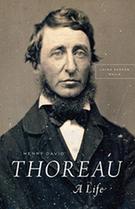The question pops up often, in variations on this theme: "Which three writers, dead or alive, would you invite to a literary dinner party?" My answer has long been the same: Ralph Waldo Emerson, Margaret Fuller and Henry David Thoreau at Emerson's house in Concord, Mass.
I'd never get a word in edgewise. That would be fine.
 I thought about this recently after reading Henry David Thoreau: A Life by Laura Dassow Walls, a fine exploration of Thoreau the writer. As sometimes happens with biographies, I opened the book thinking I already knew a lot about the subject. Five hundred pages later, I emerged humbled once again by revelations about and astute interpretations of Thoreau's singular life.
I thought about this recently after reading Henry David Thoreau: A Life by Laura Dassow Walls, a fine exploration of Thoreau the writer. As sometimes happens with biographies, I opened the book thinking I already knew a lot about the subject. Five hundred pages later, I emerged humbled once again by revelations about and astute interpretations of Thoreau's singular life.
On a shelf near my desk is a ragged Modern Library edition of Walden that I purchased in the late 1960s. It represents my introduction to the Concord gang. "Everyone who comes to Thoreau has a story," Walls writes in her introduction. "Mine begins in a neighborhood bookstore where I pulled a book off the shelf simply because it was small and green--like the little green book I'd been carrying around (filched from my father's library) by a writer named Ralph Waldo Emerson."
 Walls reminded me that all assumptions about 19th-century Concord are, and always will be, subject to revision. I experienced a similar jolt in the 1990s while reading Robert Richardson's dazzling book Emerson: The Mind on Fire and again a few years ago with Megan Marshall's excellent Margaret Fuller: A New American Life. Minds on fire indeed.
Walls reminded me that all assumptions about 19th-century Concord are, and always will be, subject to revision. I experienced a similar jolt in the 1990s while reading Robert Richardson's dazzling book Emerson: The Mind on Fire and again a few years ago with Megan Marshall's excellent Margaret Fuller: A New American Life. Minds on fire indeed.
Early in her new book, Walls recounts a moment when Fuller, as editor of Dial, rejects an essay by the young Thoreau: "The challenge she offered was tremendous: no models existed for what Thoreau was attempting. He was on his own, bearing the potential for greatness but also the knowledge that getting to that greatness meant a leap to originality--a leap he didn't know how to make." I'd love to talk about that over dinner. --Robert Gray, contributing editor

